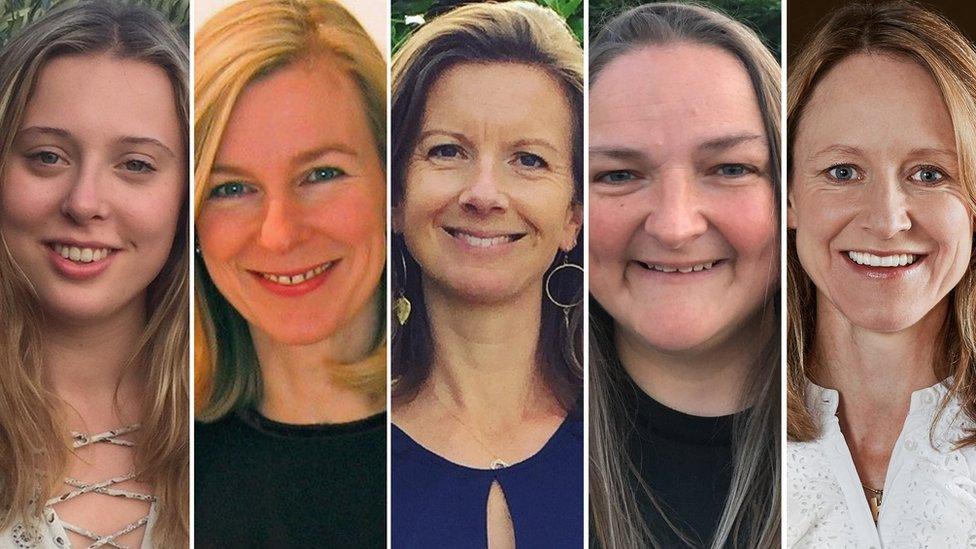Daughters in legal bid for House of Lords seat rights
- Published

(L-R) Lady Eliza Dundas, Sarah Long, Lady Willa Franks, Tanya Field and Hatta Byng are involved in the case
Five daughters of hereditary peers are to challenge a law that stops them from being elected to the House of Lords.
They are taking the government to the European Court of Human Rights in a bid to end the system of male primogeniture which has resulted in almost all titles being passed to male heirs.
Lawyers argue they face discrimination on the grounds of their gender.
The group accuse the government of "double standards" because it promotes women's rights.
The woman involved in the case are: Lady Willa Franks, eldest daughter of the Earl of Balfour; Lady Eliza Dundas, eldest daughter of the Earl of Ronaldshay; Sarah Long, elder sister to the current Viscount Long of Wraxall; Tanya Field, eldest daughter of the Earl of Macclesfield, and Hatta Byng, eldest daughter of Viscount Torrington.
Under the principle of male primogeniture, sons, nephews and uncles take precedence over daughters, nieces and aunts when a title is passed on to the next generation.
All but one of 92 current hereditary peers are male
The five women, who are part of the Daughters' Rights campaign, want the UK government to remove the word "male" from legislation they describe as "outdated" so they can stand for by-elections to the Lords.
There are about 800 members of the House of Lords, the upper house of Parliament. The saw most hereditary peers lose their right to a seat, but 92 still sit in the chamber and when their positions become vacant a successor is elected.
While some hereditary titles can be inherited by women because of the rules surrounding the way they were originally created, all but one of 92 current hereditary peers are male.
The Daughters' Rights campaign says the system breaches Article 14 of the European Convention on Human Rights, when taken alongside Article 3 of the First Protocol, the right to a free election.
Downton Abbey law
New rules on royal succession came into force in 2015 to remove male bias, meaning that Princess Charlotte is currently fourth in line to the throne.
In 2013 the was introduced in the Lords with a view to allowing for equal succession of female heirs to hereditary titles and peerages but it was voted down.
That proposed change became known as the Downton Abbey law after the ITV drama series carried a storyline where the Earl of Grantham's title passed to a distant relative he had never met, instead of one of his three daughters.
UK courts do not have oversight over the rules governing parliamentary procedure.
Solicitor Paul Hardy, from law firm DLA Piper which is bringing the case, said the application to the European Court of Human Rights "raises profound questions about sexual equality and membership of the House of Lords".
The barrister for the campaign, Edward Legard, said: "It seems wrong in a country where women, including now royal women, are born with equal opportunities, that we continue to discriminate against one group based only on gender."
- Published30 November 2017
- Published6 February 2013